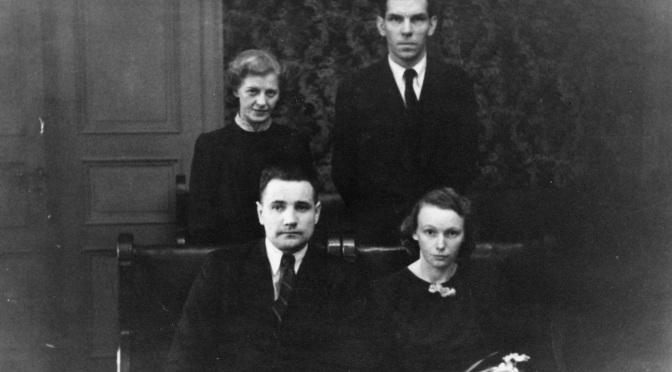My parents’ wartime wedding in Valmiera, Latvia (1944).
As a new fiction writer, I wanted to learn everything that I could. That meant putting my work out for review before submitting it to literary journals. And only submitting to top journals (and the occasional new journal that caught my eye), lest I publish prematurely and delude myself that I was better than I actually was.
Fortunately, my early writing was deemed good enough to not only get me published in a few places that made me proud but also to elicit the sort of rejection letters from others that provided feedback on the specific strengths and weaknesses of a particular piece.
Interestingly, some seasoned editors’ comments did not differ much from those provided by some of my peers in the workshops that I attended. When I presented my first story, “Making Soup,” at my first workshop, Advanced Fiction at The Writer’s Center, nearly everyone liked my use of language and most had a hard time with my making the narrator a one-month-old infant. Then, there was this:
I think this is an interesting vignette of a family coping with the annoyances of war . . . This story seems to lack drama. Air raid sirens are dramatic, but there’s no sense that I should care about the characters. They seem bored by what’s happening, so why should the reader care about what is happening?
Fortunately, I was sufficiently experienced in other areas to be circumspect about such comments. A critique, after all, says at least as much about the person providing it as it does about the work itself. Clearly, most who came to such conclusions had never been in a war zone or had close contact with victims of war or displaced persons.
But I knew there was more to it than that. When people point out problems, what they say is amiss may not be so. But something, nevertheless, is. What I had wanted to convey but failed to do was similar to what Emily Dickinson had succeeded doing in three stanzas:
After great pain, a formal feeling comes –
The Nerves sit ceremonious, like Tombs –
The stiff Heart questions ‘was it He, that bore,’
And ‘Yesterday, or Centuries before’?
The Feet, mechanical, go round –
A Wooden way
Of Ground, or Air, or Ought –
Regardless grown,
A Quartz contentment, like a stone –
This is the Hour of Lead –
Remembered, if outlived,
As Freezing persons, recollect the Snow –
First – Chill – then Stupor – then the letting go –
I also wanted to show that once people lost everything they had, about all they had left was each other and their stories (and a few bad jokes). Being “dramatic,” I knew from my relatives, had little survival value. You had to keep your cool and maintain a low profile.
Instead of trying to satisfy readers, I made a deliberate effort to bring my style into line with the requirements of my characters. After “Making Soup” was named a finalist in a Glimmer Train contest but before it was published in TriQuarterly, I started “Winter Wonderland,” the most restrained, laconic piece that I have ever written.
That seemed to work. Selecting it for publication in Atticus Review, Editor-In-Chief Katrina Gray said in the introduction to the issue:
“Winter Wonderland” is a masterpiece. I’m not sure I’ve read another story that so brilliantly gives various perspectives of a suicide attempt, including the attempt-er herself, whose voice is not a crazy one, but steady, normal, kindhearted, and sensitive. The tone and structure are admirable, and the shifting points-of-view were conveyed effortlessly.
I still receive telling rejection letters. The one that arrived today concerned “That Dress,” a tale of a wedding that takes place in the Midwest of the Fifties but is undermined by one that occurred a decade before in war-torn Latvia. It is based in part on my parents’ 1944 wedding in Latvia. The editor said that the reviewers all liked it but felt that “there isn’t enough tension to keep the story moving.”
Maybe I will consult Carson McCullers’ The Member of the Wedding, which includes a girl about the same age as the one in my story and as much an “unjoined person” as mine. Who tries to insert herself into a marriage quite as much as my girl’s mother does. What I will not do is introduce hyped-up scenes that never could have occurred. If McCullers could create a compelling story in an atmosphere once described as both “numb and fevered,” I can learn to do so, as well.
That it could be a while before the piece is published does not concern me much. When it does, I will remember a remarkably bright but frequently disobliging Florentine oceanographer that I knew when I was working on NASA’s EOSDIS project. She had recently left to accept a new position, and we all wondered how that was going.
“How do they like you there?” one of us finally asked.
“They will,” Julietta replied.

2 thoughts on “A Formal Feeling Comes”